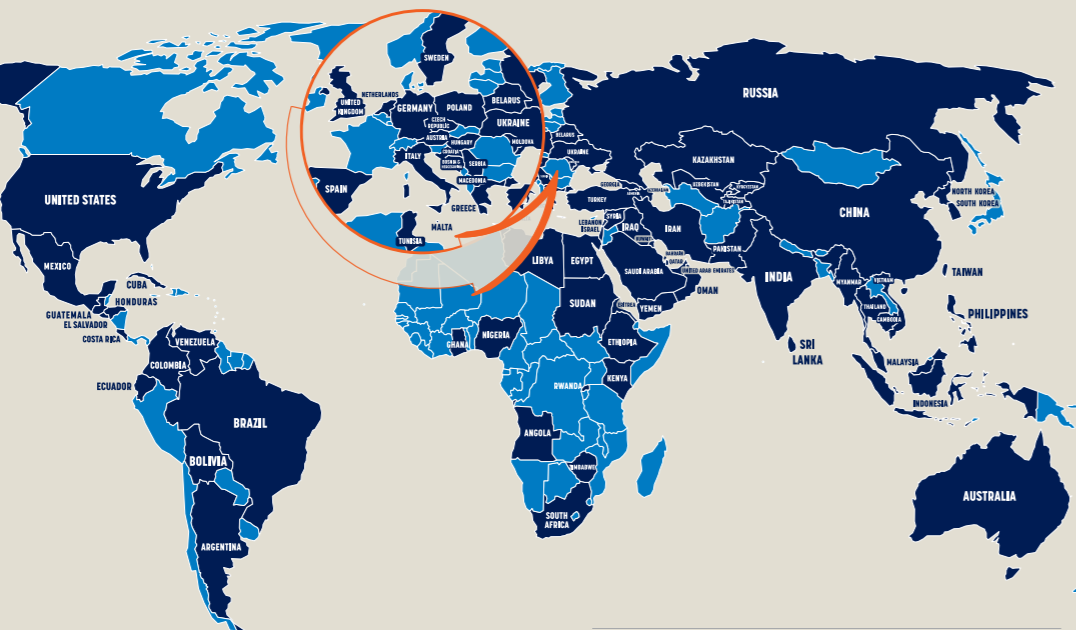Weekly Roundup 1/20/21

Following the return and detention of popular opposition figure and Kremlin critic Alexei Navalny, Roskomnadzor, the Russian government’s communications watchdog, has asked social media platforms to stop the spread of posts encouraging minors to take part in unsanctioned rallies in support of his release from jail. It requested that TikTok and Vkontakte prevent the dissemination of information that could lead minors to engage in "illegal activities that put their lives and health in danger."
Protests in Russia that involve more than one person must receive authorization in advance, which has led to the emergence of single-person pickets as a means for citizens to express dissatisfaction. Unauthorized protests still occur, but are generally met with fierce crackdowns by law enforcement. If TikTok's parent company, ByteDance, refuses to restrict the visibility of Navalny-related content to the app's young audience, it could face heavy fines from Roskomnadzor, and give the authorities ground to create Russia's own version of TikTok in its quest for a sovereign, surveillable internet.
Top weekly tech headlines, curated for you:
ICT4D:
- The World Economic Forum has published a brief on the importance of human-centered approaches to data privacy and protection. The paper emphasizes the opportunities of human-centered approaches to lead to greater innovation.
- A new piece in The Economist paints a hopeful picture for technological advancement and economic growth in the next decade. While the 2010s were a decade of technological pessimism, increased investment in tech sectors, the wide adoption of digital tools during the coronavirus pandemic, and rapid advancements in biology and medicine give us an opportunity to push the boundaries of tech for good in the years ahead.
- A paper from researchers at the University of Groningen questions whether blockchain and distributed ledger technology can be used to advance human rights through legal identification. They examine legal and political realities to assess whether blockchain would manifest existing structures of discrimination and inequality.
Open Internet:
- A new post on CIPESA's blog details the different approaches Museveni's government took to limit free speech and undermine opposition candidates ahead of Uganda's 2021 elections. From a biased communications regulator to massive efforts to manipulate discourse through inauthentic accounts, the government continued to escalate its tactics until it ordered a full-scale internet shutdown as Ugandan citizens headed to the polls.
Disinformation:
- After taking action against President Trump's accounts for violations of policies against inciting violence, Facebook and Twitter have faced international pressure to enforce those policies more uniformly in smaller countries, where online content has led to ethnic violence, political disinformation, and where leaders in places from Poland to the Philippines use social media to target and encourage violence against journalists and minority groups. Some members of the European Parliament expressed concern that companies were able to remove accounts of elected leaders without any oversight.
- The Atlantic Council's DFRLab has identified a network of PR firms, news organizations, and social media accounts that promoted Uganda's incumbent president, Yoweri Museveni, ahead of the country's January 14th elections.
- Research from the Oxford Internet Institute has revealed that political manipulation of social media is an industrial-scale problem that poses a massive threat to democracies today. Private firms specializing in "strategic communications" play an increasing role in spreading disinformation on behalf of state actors and political parties who wish to artificially influence online public discourse.
- After Amazon Web Services refused to continue hosting Parler, a social media platform used to plot the Capitol attack and popular among far-right extremist groups in the U.S., the site was down for a short time. Parler is now back online, thanks to Russian tech firm DDoS-Guard. The company has stepped in to host other conspiracy sites such as 8kun.
AI:
- A new patent from Chinese technology giant Huawei includes mentions of a system that can identify pedestrians by ethnicity. A facial recognition research group also found references to identification of Uighurs and other ethnicities in patents filed by AI and image recognition firms in China. The company denied selling any system that identifies people by their ethnic group.
